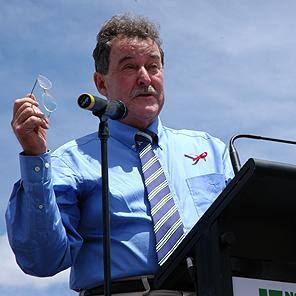It’s a trial described as potentially “bigger than Mabo”
Peter Spencer’s story is one I didn’t think could happen in Australia. He is the farmer in New South Wales who bought a farm and then lost 80% of it when rules changed to stop people clearing native vegetation. Unable to use most of his property, he was slowly bankrupted. Though he broke no law, he lost his life’s work and his beloved farm in late 2010. There was no way out. He couldn’t sell the property — who would buy a piece of land that could not be used? Farmers all around Australia lost billions of dollars in assets as the value of their land and produce declined. The legality of this is finally being tested in the Federal Court in Sydney starting this Monday, November 24, and continuing for the next three weeks. Hold your breath. This could be an enormous case, with implications for land holders across the continent.
The Federal Government can’t take your assets without paying, but the state governments can
The Native Vegetation Acts were brought in by the states to stop farmers clearing native plants — but no compensation was ever paid to farmers. The Federal Government used the carbon credits contained in that vegetation to meet Australia’s obligations under the Kyoto Protocol, yet the burden of supplying these credits fell on some farmers and not on other Australians.
The Commonwealth is not allowed to confiscate assets without due compensation — it’s in the Australian Constitution. But states can do it. So what if the Federal Government makes an arrangement with the states for the states to make the confiscatory laws instead — does that get around the Constitution, is that ok?
Carbon credits stored on farms are worth a lot of money
If Australia had emitted more than it was allowed to under the Kyoto Treaty then the Federal Government would supposedly have had to purchase carbon credits from overseas. As it happens Australia did meet its Kyoto obligations — our average emissions during 2008 through 2012 did not exceed 108% of the emissions in 1990 (the base year). In the event, after 2012, the countries that failed to meet their Kyoto obligations did not actually purchase credits, but when the Treaty was signed and when the Native Vegetation Acts were passed it was widely thought that they would have to. Some of the touted carbon credit prices were quite high– the recent Carbon Tax was $24.15 per tonne, for instance — and national emissions are measured in billions of tonnes.
Australia met its Kyoto obligations by stopping land clearing, but otherwise pretty much pursuing business-as-usual. The cost of meeting Australia’s obligations thus fell almost entirely on those farmers who were prevented from land clearing, and it was the Native Vegetation Acts of the states that did the preventing. In the 1990 base year, about 23% of Australia’s emissions were due to land clearing. By stopping land clearing, Australia could emit about 31% (= 8% + 23% ) more in the average year in 2008 to 2012 than in 1990, in all other sectors combined.
The Native Vegetation Act also has the perverse incentive of discouraging farmers from planting native plants. It now makes more sense to plant foreign species. What farmer could afford to let Australian trees grow?
Peter Spencer is doing this on behalf of all property owners in Australia and is determined not to give in

Peter Spencer
The funding ran out mid year, so he is representing himself. Spencer applied to the judge in October for more time to raise funds and find a lawyer to represent him, but the judge decided that the case was of public importance, had been delayed far too long already and he should go ahead without a lawyer. Spencer feels he has no choice but to make the most of it.

A satellite image of Saarahnlee It is almost all mountainous native bushland. Yellow markers show significant points on his farm. (Click to enlarge).
Peter Spencer’s fight has been going on for years. Remarkably, he soldiers on, undaunted, long after most men would have given up. Read this ABC interview from 2005 for a little background.
His farm, Saarahnlee, was possibly the highest altitude working farm in Australia, near Adaminaby at 1,500m. Spencer was involved in research and development toward high altitude projects like Merino breeding programs with CSIRO, trout farming, Korean Ginseng, and forest harvesting of Mountain Gum and Mountain Ash. At the highest point of his property a study on wind farming with a hydro pump system was under development with the ANZ Bank. The aim was to make it profitable without government subsidies. Spencer was pursuing creative and experimental projects related high altitude farming in Australia.
Should Australia be a country where honest work and personal assets can be randomly destroyed without compensation by the government? Should a few citizens be forced to bear the costs of the many, or do we share the load fairly?
If we want Australia to be a free and fair land, we need to do something: to draw the line — and stand up for what we know is right. The creeping power of capricious bureaucrats must be halted.
What kind of country do we want to live in?
He needs our help.
———————————————————-
More information:
Peter Spencer’s new blog: (add your voice)
Support Peter Spencer on Facebook.
Details of the Federal Court Case in Sydney Please go if you can!
———————————————————-
How you can help
1. Help pay the costs
There are three ways to donate. 1: Paypal, 2: Direct Deposit, or 3: Cheque.
1. (Paypal accepts credit cards from people without paypal accounts).
(Paypal accepts credit cards from people without paypal accounts).

